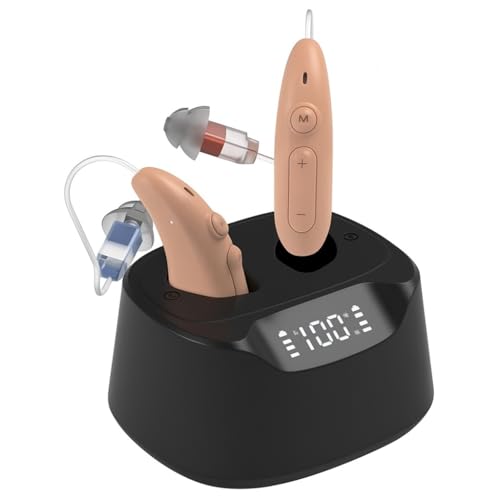In our fast-paced society, navigating the world of insurance for cochlear implants can be quite a daunting task. Understanding the intricacies of insurance policies and reimbursement procedures is crucial when it comes to securing coverage for crucial hearing aids.
Are you curious about the specific steps involved in ensuring your insurance covers cochlear implants? Let's explore the ins and outs of this process together, demystifying the complexities and providing actionable insights for a smoother insurance journey.
Key Takeaways
- Review insurance policies for cochlear implant coverage details.
- Seek pre-approval and be prepared for potential denials.
- Utilize appeals process if coverage is wrongfully denied.
- Contact implant centers for guidance on reimbursement and support.

WASOCA Hearing Aids for Seniors, Hearing Aids Rechargeable with Bluetooth, Hearing Aid APP Control, Hearing Amplifier for The Hearing Loss, Hearing Your Voice, FSA&HSA Eligible
Hearing Aid & Bluetooth 2 in 1 : Hearing aids realize hearing aid and Bluetooth function 2 in...
As an affiliate, we earn on qualifying purchases.
Understanding Insurance Coverage for Cochlear Implants
Understanding insurance coverage for cochlear implants is essential for individuals seeking access to this life-changing technology. Private insurance plans, including over 90% of employer health insurance plans, often provide coverage for cochlear implant surgery. Additionally, federal health plans such as Medicare, TRICARE, and VA offer coverage for cochlear implants, ensuring that individuals have access to these vital services. For children under 21, Medicaid programs are mandated to cover cochlear implants, highlighting the significance of early intervention and support in this demographic.
However, challenges may arise as insurance companies sometimes categorize cochlear implants as hearing aids, potentially leading to denial of coverage. In such cases, advocacy and appeals play a crucial role in overturning these decisions. Seeking assistance from cochlear implant centers or manufacturers can also be beneficial in navigating the insurance reimbursement process effectively. By understanding the nuances of insurance coverage for cochlear implants and being proactive in advocacy efforts, individuals can enhance their chances of securing the necessary financial support for this transformative technology.

Banglijian Rechargeable Hearing Aid for Moderate to Severe Hearing Loss Ziv-206 for Seniors Adults with Noise Reduction Adaptive Feedback Cancellation-Two Types of Sound Tubes(Two Units)
EASY USE AND COMFORTABLE FEATURE: Banglijian is a professional hearing aid manufacturer and seller, which have produced a...
As an affiliate, we earn on qualifying purchases.
Checking Policy for Cochlear Implant Coverage

When reviewing your insurance policy for cochlear implant coverage, it's crucial to examine specific details related to surgical procedures and device costs. Ensure that your insurance plan includes prosthetic/orthotics coverage, as cochlear implants may fall under this category rather than being classified as hearing aids.
Some insurance companies mistakenly categorize cochlear implants as hearing aids, which can lead to coverage denial. In the event that your claim for cochlear implant coverage is denied, consider following the appeal process by submitting a written appeal and seeking assistance from the implant center or manufacturers.
It's essential to reach out to cochlear implant companies for guidance and support in navigating the insurance reimbursement process. Understanding the coverage details outlined in your insurance policy is key to ensuring that your cochlear implant procedure is covered appropriately.
Be proactive in clarifying any ambiguities and seeking the necessary support to facilitate insurance coverage for your cochlear implant.

Soundure Hearing Aids for Seniors, OTC Hearing Aids for People with severe Hearing Loss, Smart Noise Reduction Chips, Stand for 80h, One-Button Operation, Comfortable Wearing
Clearer Conversations in Daily Life: These hearing aids use digital noise reduction technology to make voices sound clearer...
As an affiliate, we earn on qualifying purchases.
Steps to Submit Insurance Documents for Cochlear Implants
To initiate the insurance coverage process for cochlear implants, gather all required documentation, including pre-authorization forms and medical necessity letters, before submitting them to Cochlear for verification and processing. Ensure all insurance documents are complete and accurate to prevent delays in the approval process.
Once the forms are submitted, be prepared to provide any additional information requested promptly. It's crucial to follow up with the insurance company regularly to track the progress of the submission and ensure timely review.
Keep detailed records of all communication and documentation related to the insurance submission for future reference. By maintaining organized records and staying proactive in communication, you can facilitate a smoother insurance approval process for cochlear implants.

B501 Professional Hearing Aids for Severe Hearing Loss Seniors- 45dB Gain & 16-Channel Precision, Anti-Whistling Tech, 50H Battery with Charging Case, Self-Fitting Discreet Design
45dB Broadband Response for Severe Hearing Loss. Customized gain amplification up to 45dB covers even profound hearing loss,...
As an affiliate, we earn on qualifying purchases.
Tips for Getting Cochlear Implants Covered by Insurance

To optimize your chances of securing insurance coverage for cochlear implants, it's essential to proactively explore your policy's specifics and engage with your insurance provider for pre-approval before proceeding with the implantation process.
Here are some tips to help you navigate the insurance coverage process effectively:
- Review Your Insurance Policy: Thoroughly examine your insurance policy to understand the coverage details related to cochlear implants, including surgical procedures and device costs.
- Obtain Pre-Approval: Contact your insurance company to obtain pre-approval for cochlear implantation to ensure a smoother reimbursement process.
- Be Aware of Potential Denials: Some insurance companies may categorize cochlear implants as hearing aids, which could lead to coverage denials. Be prepared for this possibility.
- Consider Appeals: If your claim for cochlear implant coverage is denied, consider appealing the decision in writing. Seek assistance from the cochlear implant center or manufacturers to support your appeal efforts.
Common Insurance Questions About Cochlear Implants
Understanding the various insurance questions surrounding cochlear implants is crucial for individuals considering this hearing solution. Insurance coverage for cochlear implants is often categorized under prosthetic/orthotics benefits rather than hearing aids.
More than 90% of private employer health insurance plans in the US offer coverage for cochlear implant surgery, making it accessible to many individuals. Additionally, Medicaid programs are required to cover cochlear implants for children under 21, ensuring that this essential treatment is available to those in need.
If insurance denies coverage for cochlear implants, individuals have the option to appeal the decision in writing and can seek assistance from the implant center or manufacturers. Contacting cochlear implant companies for support can help navigate insurance reimbursement processes effectively, providing individuals with the necessary guidance and resources to access this life-changing technology.
Frequently Asked Questions
Will Insurance Cover a Cochlear Implant?
Yes, insurance coverage for a cochlear implant depends on the specific plan and provider.
Many private employer health insurance plans in the US typically cover cochlear implant surgery. Federal health plans such as Medicare, TRICARE, and VA also offer coverage for cochlear implants.
Medicaid programs are mandated to cover cochlear implants for children under 21. State programs may provide coverage based on eligibility.
However, some insurance companies may classify cochlear implants as hearing aids, potentially leading to coverage denial.
How Do You Qualify for a Cochlear Implant?
We qualify for a cochlear implant based on bilateral moderate-to-profound sensorineural hearing loss. Limited benefit from hearing aids plays a key role.
Cognitive ability to interpret sound effectively matters too. The cochlear lumen must be suitable, and contraindications to surgery are ruled out.
Sometimes, participation in an FDA-approved trial is necessary. These factors collectively determine eligibility for a cochlear implant.
How to Get Free Cochlear Implant?
To get a free cochlear implant, we should explore various financial assistance programs, insurance coverage options, disability benefits, and support from cochlear implant centers.
Medicaid, Medicare, and some private insurance plans may cover the cost for eligible individuals. Seeking guidance from social service organizations and manufacturers can help navigate the process.
Is the Average Cost for Cochlear Implants Is Around $50000 Most Insurance Companies Cover the Majority of the Cost?
Yes, the average cost for cochlear implants is typically around $50,000, but most insurance companies cover the majority of this expense.
Insurance coverage often includes surgical costs, device expenses, and post-operative rehabilitation services.
It's crucial for patients to review their insurance policy for details like coverage limits, co-pays, and deductibles to understand their financial obligations.
Contacting the insurance provider or a cochlear implant center can assist in navigating the coverage process efficiently.
Conclusion
In navigating insurance coverage for cochlear implants, we've uncovered the intricate process of checking policies, submitting documents, and addressing common questions.
By following these steps diligently, we can ensure that insurance companies cover the essential hearing devices that improve quality of life.
Remember, patience and persistence are key in this journey towards accessing the benefits of cochlear implants through insurance.










